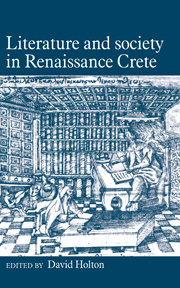Book contents
6 - Tragedy
Published online by Cambridge University Press: 14 October 2009
Summary
There are three extant tragedies in Cretan literature, if we exclude Francesco Bozza's Fedra (1578), which was written in Italian (Zoras 1972; cf. Puchner 1980a: 89f.); they are: Erofili by Georgios Chortatsis, King Rodholinos by Ioannis Andreas Troilos and the anonymous Zinon. Unlike the Cretan comedies they can hardly be compared with one another and belong to different levels of style, ranging from late Renaissance via Mannerism to Jesuit baroque. Common characteristics are confined to formal dramaturgical conventions: the prologue, the five-act structure and the use of choric odes. The usual metre is the political verse with rhyming couplets. Only in the choric odes (in Zinon also in otherwise elevated passages of text) are other metres used, such as hendecasyllabics in terza and ottava rima. Interludes are found only in the versions of Erofili (see Chapter 7).
I Erofili (Eρωφίλη)
(a) Basic information
This classicising tragedy of 3,205 verses is by far the most famous, the most often published (as a chapbook in Venice) and the most performed tragedy of the Cretan theatre. It also has the most intensive Nachleben in literature and folklore. The play was written in Rethymno around 1600 or shortly before and has Georgios Chortatsis as its author. The author was well known in his own time but we do not know much about him now: Evangelatos identified him with a Georgios Chortatsis, son of Gianni, who was born c. 1545 or earlier, and died in 1610.
- Type
- Chapter
- Information
- Literature and Society in Renaissance Crete , pp. 129 - 158Publisher: Cambridge University PressPrint publication year: 1991
- 3
- Cited by



